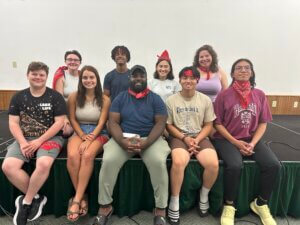Supportive community leads multicultural students down the right track: Reg Hawkins
March 19, 2024
| By La Crosse Community Foundation |
Building a supportive community for diverse students
As assistant director of retention at the University of Wisconsin-La Crosse, Reg Hawkins plays a critical role in guiding multicultural students toward a successful college journey. Through the Multicultural Student Services office, he oversees two widely tested, high-impact programs to build a supportive community for diverse students, ensuring their sense of belonging and support right from their first year.
His office uses a comprehensive strategy focused on academic excellence, leadership, and personal and social development for students who identify as African American, Indigenous/American Indian, Hispanic/Latine, Asian American, Hmoob, and biracial or multi-ethnic. Hawkins’ approach emphasizes social capital — helping students understand and develop it as a key component of their education. It’s an objective that extends beyond academic achievement, however, as it fosters an environment where every student can develop the networks and relationships essential for their future.

University of Wisconsin – La Crosse Assistant Director of Retention Reg Hawkins (front, center) works with student staff members at residence life training. His work focuses on preparing diverse students to achieve academic and life success through developing social capital.
What is the role of social capital and a supportive community in recruiting and retaining multicultural students?
Students of color face systemic difficulties that serve as barriers to their admission into universities. A major factor impacting the enrollment process among multicultural college students is college readiness. Often, multicultural students come from environments that are not well-equipped with the appropriate information or access to resources. The use of social capital within the recruitment process is integral to enhancing the knowledge base in communities of color. By raising awareness, we provide a pathway for multicultural students to not only attend college but also find success in whatever degree path they seek.
Once we’ve made a connection prior to college, we must continue our support throughout their time seeking their degree and beyond. Within my office, we offer various programs such as financial aid assistance, grants, and information about culturally based organizations, among other opportunities that offer a more holistic approach to their needs.
How do you cultivate social capital among students, and how do the efforts and benefits extend to the greater community?
Throughout my time in higher education, I have dedicated my career to fostering environments that utilize vulnerability as a powerful tool for connection. Vulnerability is essential to cultivating social capital because embracing it allows us to build trust and comfort with those in our community. To functionalize this idea, I have guided student groups in discussions surrounding identity development and how various social issues impact their lived experiences. By amplifying these voices, students challenge dominant narratives and counteract stereotypes, empowering individuals to reclaim their own stories and be a community that supports each other.
Additionally, these opportunities for storytelling allow us to gain a greater awareness of equity concerns, build empathy, and mobilize these stories. As we hear student stories, we can use them to guide our decision-making in our respective areas of influence to promote equitable shifts in society.
What advice do you share with students wanting to enhance their social capital?
Look for spaces that are committed to community care. In a country where rugged individualism is seen as exemplary of success, community care embraces the fact that we all need each other to be the best versions of ourselves. Community care can be as simple as just sending someone a text letting them know that you can go get food from the cafeteria because they are unwell.
As multicultural students, being in predominately white spaces can often feel like you are buried. Instead of a burial, however, I believe our ancestors collectively planted us because they knew that someday we would sprout and become the fruit born from their labor to get us here. As the “fruit,” you have an opportunity to transform spaces with the rich perspectives you bring. It can be daunting to actualize this alone, but through community, we can achieve so much.
